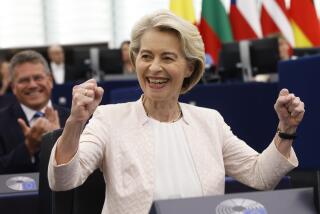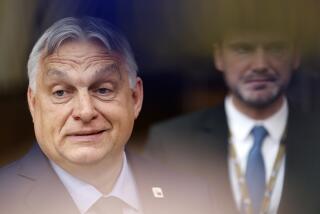Berlusconi’s EU Moves Lead to Calls for Reform of Office
- Share via
ROME — Italian Prime Minister Silvio Berlusconi likes to do things his way.
In recent weeks, he has staked out policies completely out of line with the European Union. This might not be a problem, except that Berlusconi is president of the EU these days.
His renegade style, especially where sensitive relations with Russia and Israel are concerned, has led to grumbling in Brussels, where the EU is based, and calls for the reform of the entire EU presidency system.
“He embodies everything that is wrong with the system,” said Steven Everts, a senior research fellow with the London-based Center for European Reform. “He lacks the political discipline and is at odds with agreed EU policy.”
The presidency of the EU is rotated among member countries every six months. Italy and Berlusconi took over July 1 and will relinquish the position to Ireland on Jan. 1. This term happens to be a critical one because the 15-nation group (with 10 more set to join in May) is trying to complete a landmark constitution by year’s end.
Arguably, the presidency is largely symbolic, because other executive officers oversee key policies. But observers of the EU contend that a sharp and talented prime minister occupying the post can become an effective advocate for the organization. An inactive or inattentive leader, on the other hand, can slow projects and allow the organization to drift.
Among the reforms bandied about are eliminating the position or limiting its functions to economic matters and excluding foreign policy.
There’s no doubt that someone as flamboyant as Berlusconi draws attention to what is otherwise a mundane office. Brussels was especially irked when Berlusconi played host to Russian President Vladimir V. Putin at an EU-Russia summit this month in Rome. At a news conference concluding the summit, Berlusconi stunned just about everyone by voicing support for Moscow’s war in separatist Chechnya and glossing over Putin’s decision to jail Russian magnate Mikhail Khodorkovsky.
“I’m acting as President Putin’s defense lawyer here,” Berlusconi said, adding that he felt the media distorted the picture in Chechnya.
In fact, the EU has made improving Russia’s human rights record in Chechnya a condition of membership. EU External Relations Commissioner Chris Patten said the Italian prime minister was simply wrong, and EU foreign ministers complained.
As a result of Berlusconi’s remarks, the EU felt obliged to clarify its position on Russia and put it in writing, and the European Parliament censured Berlusconi’s comments Thursday.
Berlusconi, speaking Thursday night in Warsaw, said he had been misunderstood. An aide said in a telephone interview Friday that Berlusconi feels it is important to maintain good relations with Moscow.
Berlusconi’s high-profile support for Israel has also put him outside the EU box. He showcased his friendship with Israeli Prime Minister Ariel Sharon when the latter came to Rome last week seeking an ally to help deflect EU criticism over Israel’s handling of its conflict with the Palestinians.
Sharon has declared Italy, under Berlusconi, Israel’s best friend in Europe. Israeli officials are delighted with Berlusconi, saying he has finally introduced “balance” to the EU, which has generally taken a sympathetic stance toward the Palestinians.
“It’s not that he’s pro-Israeli, he’s a realist,” said an Israeli official, speaking on condition of anonymity. “He’s not a politician, but a businessman. He knows how to network, how to schmooze. He can show there’s always something to gain.”
Berlusconi and Sharon are said to genuinely enjoy each other’s company, exchanging jokes and backslaps during shared dinners and meetings. Berlusconi is also keenly aware that Rome’s friendship with Israel is met with grateful approval by Washington, the ally most desired by Berlusconi.
Senior Israeli officials have refused to meet with the EU’s representative assigned to the region, Marc Otte, because he also meets with Palestinian Authority President Yasser Arafat.
If more of Europe were like Berlusconi and Italy, say the Israelis, the EU might find itself more respected and accepted in the Jewish state, even as a mediator in the ongoing conflict.
“It will depend on what legacy Berlusconi leaves and what happens Jan. 1, when Ireland takes over,” the Israeli official said. “He has shown balance is possible.”
The Berlusconi aide said the prime minister frequently speaks his mind, but he does so as the head of Italy, not of the EU. Consequently, he said, much of the criticism is unfounded.
Critics say Berlusconi’s actions and the fact that the presidency is changed every six months are harmful because the EU wants to project a coherent and effective foreign policy.
“Any non-European who has to deal with the EU finds it baffling,” Everts said. “Changing the leader every six months is no way to run a serious organization.”
More to Read
Sign up for Essential California
The most important California stories and recommendations in your inbox every morning.
You may occasionally receive promotional content from the Los Angeles Times.














